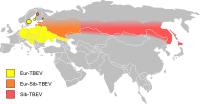
Photo from wikipedia
BACKGROUND As the epidemiology of encephalitis varies from one country to another, international travel may be an important clue for the diagnostic workout of this puzzling disease. METHODS We performed… Click to show full abstract
BACKGROUND As the epidemiology of encephalitis varies from one country to another, international travel may be an important clue for the diagnostic workout of this puzzling disease. METHODS We performed an ancillary study using the ENCEIF prospective cohort conducted in 62 clinical sites in France from 2016 to 2019. All cases of encephalitis in adults that fulfilled a case definition derived from the International Encephalitis Consortium were included. Travellers were defined as patients who spent at least one night in a foreign country within the last six months. RESULTS Of the 494 encephalitis patients enrolled, 69 (14%) were travellers. As compared to non-travellers, they were younger (median age, 48 years [interquartile range, 36-69] vs. 66 [49-76], P < 0.001), less likely to be immunocompromised: 2/69 (3%) vs 56/425 (13%), P = 0.02, and reported more arthralgia: 7/69 (10%) vs. 11/425 (3%), P = 0.007. The risk of poor outcome at hospital discharge (Glasgow outcome scale ≤ 3), was similar for travellers and for non-travellers after adjustment (aOR 0.80 [0.36-1.80], P = 0.594). Arboviruses were the main causes of encephalitis in travellers: 15/69 (22%) vs. 20/425 (5%) in non-travellers, P < 0.001, and Herpes simplex virus (HSV) was the second (9/69, 13%). Of note, in 19% (13/69) of cases, the risk of encephalitis in travellers may have been decreased with a vaccine. CONCLUSION The two primary causes of encephalitis in travellers are arboviruses, and HSV. Empirical treatment of encephalitis in travellers must include aciclovir. Pre-travel advice and vaccination may decrease the risk of encephalitis in travellers.
Journal Title: Journal of travel medicine
Year Published: 2022
Link to full text (if available)
Share on Social Media: Sign Up to like & get
recommendations!